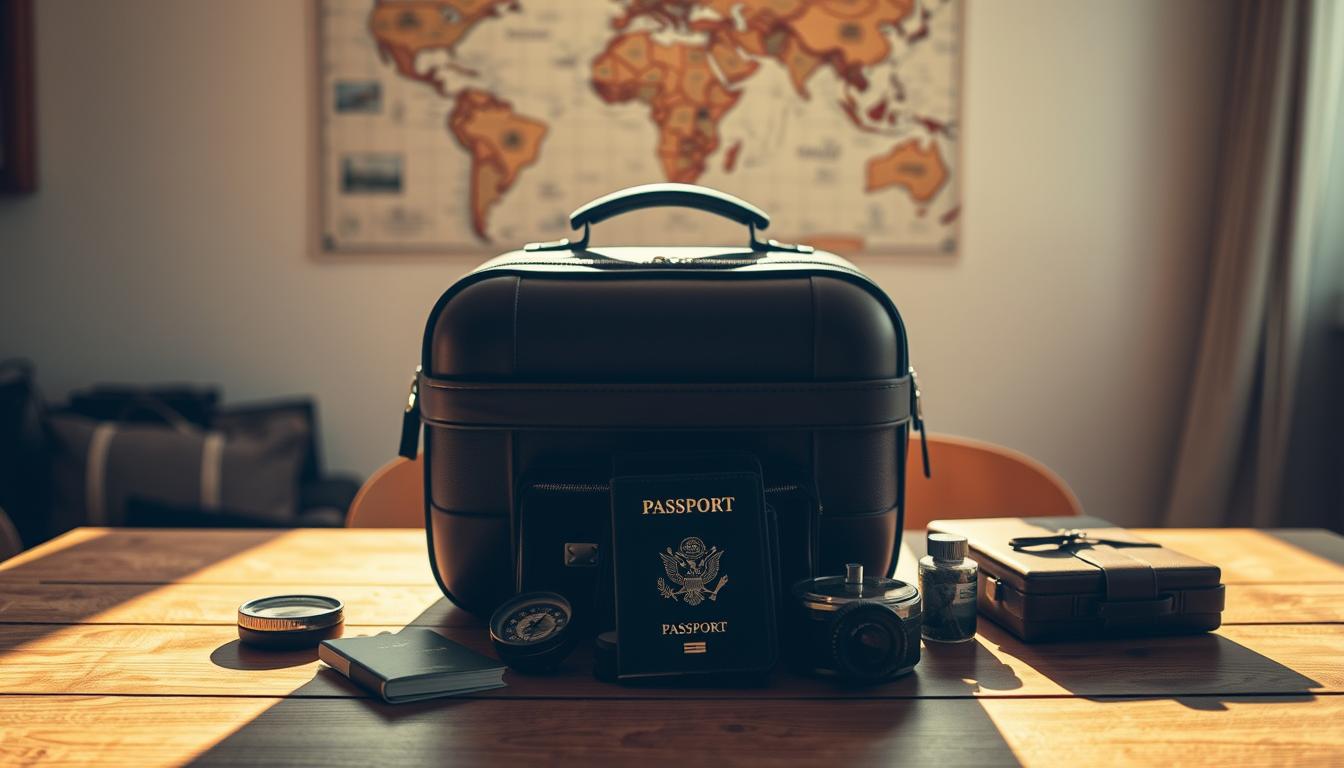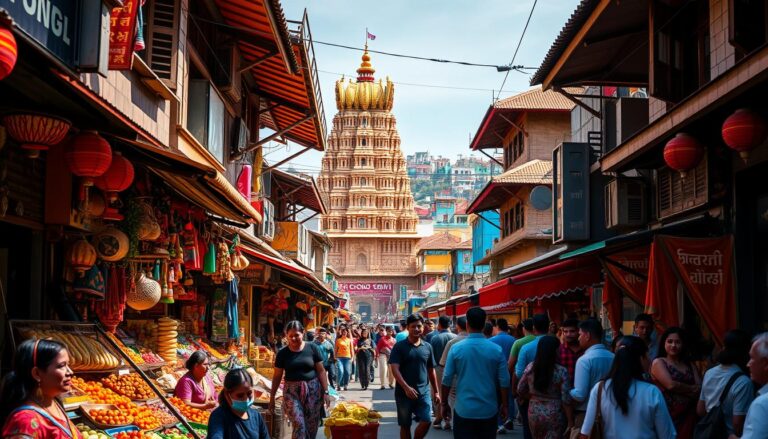
Planning a journey can feel overwhelming, but it doesn’t have to be. Think back to your first trip—the excitement, the nerves, and the lessons learned along the way. Those experiences shape how we approach every adventure. This guide is here to help you navigate the process with ease.
Drawing from years of firsthand experiences, this article shares practical advice to make your next trip smoother. From packing smart to staying safe, these insights are designed to save you time and stress. Remember, it’s not about finding the perfect deal but making the most of your journey.
Whether you’re a seasoned explorer or a first-time traveler, these tips will help you avoid common pitfalls. Let’s turn those past mistakes into future successes. Ready to dive in? Let’s get started.
Key Takeaways
- Learn from past experiences to improve future trips.
- Focus on practical advice over chasing the best deal.
- Smart packing can save time and reduce stress.
- Safety and cultural insights are essential for a smooth journey.
- Planning ahead ensures a more enjoyable adventure.
Introduction to Essential Travel Advice
Mistakes on the road often lead to the most valuable insights. Whether it’s forgetting to check passport validity or missing a flight, these moments teach us how to navigate future trips more effectively. Preparation is key, but so is learning from experience.
Even the most spontaneous adventures benefit from a little planning. While “winging it” can lead to unexpected discoveries, having a solid foundation ensures you save money and reduce stress. For example, knowing local laws—like Singapore’s ban on chewing gum—can prevent unnecessary fines.
Understanding the culture of your destination is equally important. Simple gestures, like learning a few phrases in the local language, can make a big difference. It’s not just about respecting traditions; it’s about enriching your experience in a new country.
Time is another critical factor. Many travelers try to cram too much into one trip, leading to fatigue. Instead, focus on quality over quantity. Spend more time in fewer places to truly immerse yourself in the local environment.
Here’s a quick comparison of common mistakes and how to avoid them:
| Mistake | Solution |
|---|---|
| Not checking passport validity | Ensure your passport has at least 6 months of validity. |
| Overpacking | Use packing cubes and focus on essentials. |
| Ignoring local laws | Research customs and regulations before departure. |
| Forgetting travel insurance | Invest in a policy that covers emergencies. |
These insights prepare you for the in-depth sections ahead, covering planning, packing, safety, and budget-saving strategies. Remember, every trip is an opportunity to learn and grow.
Packing Smart: Must-Have Travel Essentials
Packing efficiently can transform your journey from chaotic to seamless. The right gear and organization ensure you’re prepared for every step of your adventure. Start with the basics: a durable bag, lightweight clothing, and tools to keep everything in place.
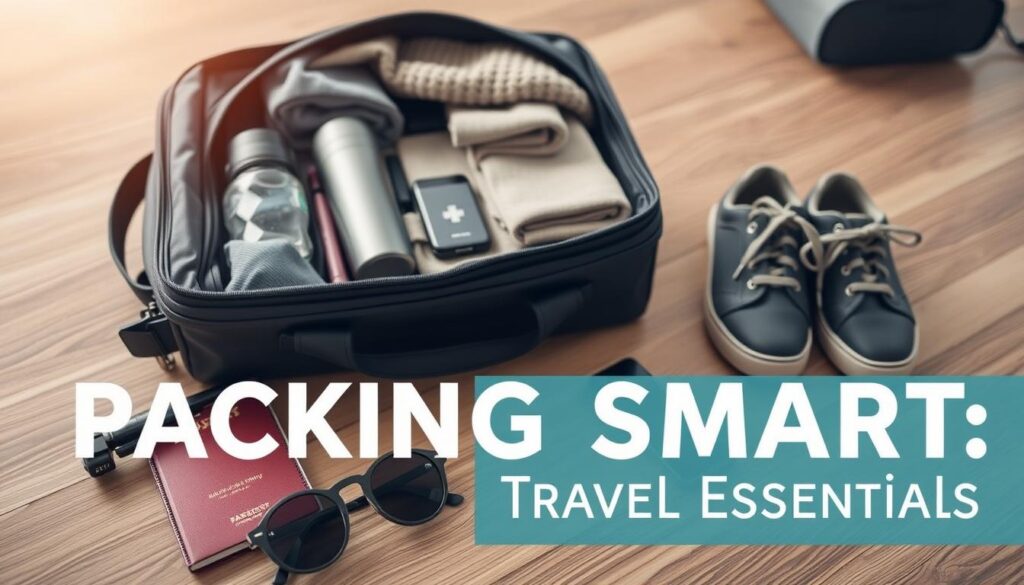
Choosing the Right Bag and Packing Cubes
Your bag is your most important tool. Opt for a durable yet practical option like the Osprey Farpoint 40, which meets carry-on requirements and weighs just 1.6kg. Pair it with packing cubes to keep items organized and easy to access.
Compression cubes are a game-changer. They maximize space and prevent overpacking. For example, rolling clothes instead of folding them reduces wrinkles and saves room. Keep a quarter of your bag empty for souvenirs or unexpected finds.
Lightweight Gear and Comfortable Clothing
Long travel days demand comfort. Choose lightweight gear like a Cabin Zero Classic backpack, which weighs only 760 grams. Focus on versatile clothing that can be mixed and matched for different outfits.
Pack essentials like 7 pairs of underwear, 6 shirts, and 3 pairs of pants. For colder climates, add a sweater and a windproof jacket. Don’t forget a backup debit card for emergencies, especially one with fair exchange rates like Wise.
Here’s a quick checklist for smart packing:
- Durable bag (e.g., Osprey Farpoint 40)
- Packing cubes for organization
- Lightweight clothing and layers
- Backup debit card for emergencies
- Portable charger and tech pouch
With these essentials, you’ll be ready for anything your journey throws your way.
Planning Your Trip for a Stress-Free Adventure
A well-planned trip can turn potential stress into pure enjoyment. Start by researching your destination thoroughly. Understanding the climate, cultural events, and local tips ensures you’re prepared for anything.
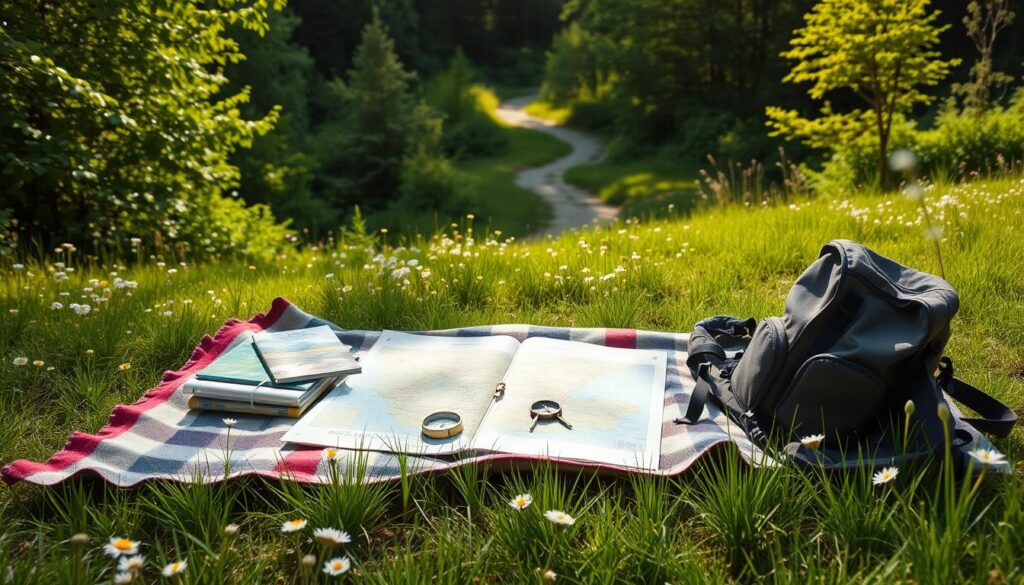
Creating a detailed itinerary is key. Include buffer days to account for delays or spontaneous activities. This approach reduces the pressure to see everything at once and allows for unexpected discoveries.
Researching Destinations and Weather
Check weather conditions before you go. Knowing what to pack can save you from unpleasant surprises. Research local events or festivals that might enhance your experience.
Use online reviews and tourism centers for insights. Verify details like proximity to attractions and safety. This ensures you choose a place that aligns with your interests and needs.
Creating Detailed Itineraries
Plan your days but leave room for flexibility. Overloading your schedule can lead to fatigue. Instead, focus on quality experiences over quantity.
Revisit your accommodations to avoid last-minute issues. Ensure your home is secure before leaving. Invest in travel insurance for peace of mind during your journey.
Here’s a quick guide to effective planning:
| Step | Action |
|---|---|
| Research | Check weather, events, and local customs. |
| Itinerary | Create a flexible schedule with buffer days. |
| Accommodations | Verify reviews and proximity to attractions. |
| Safety | Secure your home and invest in travel insurance. |
With these steps, you’ll set the stage for a stress-free and enjoyable adventure.
Choosing Accommodations that Offer Real Value
Your choice of lodging can define the way you explore a new destination. Whether it’s a cozy Airbnb, a luxurious hotel, or a budget-friendly hostel, each option has its pros and cons. The key is to focus on value, not just the lowest price.

Airbnb offers a home-like experience, often with unique spaces and local charm. However, hidden costs like cleaning fees or shared spaces can catch you off guard. Hotels provide consistency and amenities, but prices can skyrocket during peak seasons. Hostels are great for budget travelers, but privacy might be limited.
Understanding Airbnb, Hotels, and Hostels
When booking accommodations, consider your priorities. Are you looking for comfort, convenience, or cost savings? A “home base” can be strategic, especially if you plan to explore extensively. For example, staying in a central location can save time and transportation costs.
Here’s a quick comparison of popular options:
- Airbnb: Unique spaces, local vibe, but watch for hidden fees.
- Hotels: Reliable amenities, but prices vary by season.
- Hostels: Budget-friendly, but shared spaces may lack privacy.
Humorous real-life examples highlight potential pitfalls. One traveler booked a “cozy” Airbnb only to discover their “neighbor” was a noisy rooster. Another found their hostel’s “private room” was actually a curtained-off bunk bed. Always read reviews carefully to avoid surprises.
Negotiating directly with hosts or owners can lead to better rates. For instance, booking a longer stay might unlock discounts. Short-term bookings are also a smart way to test an accommodation before committing. This approach ensures you’re happy with your choice for the entire trip.
Finally, don’t forget travel insurance. It’s a small investment that can save you from unexpected costs, like cancellations or emergencies. With these tips, you’ll find accommodations that offer real value and enhance your journey.
Getting the Most Out of Local Resources
Exploring a new place becomes richer when you tap into local resources. From tourist information centers to guided walking tours, these tools offer authentic insights that guidebooks can’t match. They help you uncover hidden gems and connect with the culture in meaningful ways.

Tourist information centers are a great starting point. They provide maps, event schedules, and recommendations from locals. Make sure to visit one early in your trip to plan effectively. These centers often highlight lesser-known attractions that aren’t crowded with tourists.
Tourist Information Centers and Walking Tours
Guided walking tours are another excellent way to dive into a destination’s history and culture. Many cities offer free or low-cost options led by passionate locals. These tours provide stories and details you won’t find online, making your experience more personal and memorable.
Preparation is key to enjoying these activities. Carry a small bag with essentials like water, snacks, and a portable charger. This ensures you’re comfortable and ready to explore throughout the year, no matter the season.
Locals can transform a typical trip into an enriching adventure. For example, joining a community event or visiting a local market offers a glimpse into daily life. These interactions create lasting memories and deepen your understanding of the place.
Here are some practical tips to maximize your experience:
- Verify tour times and double-check itineraries to avoid surprises.
- Ask locals for recommendations on food, attractions, and events.
- Leave room in your schedule for spontaneous discoveries.
By leveraging local resources, you’ll gain a deeper appreciation for your destination and create a truly unique journey.
Travel Tips And Tricks: Expert Advice on the Road
Expert advice can turn a chaotic journey into a smooth adventure. Experienced travelers know that small details—like how you pack—can make a big difference. Learning everything about your destination in advance ensures a stress-free trip.
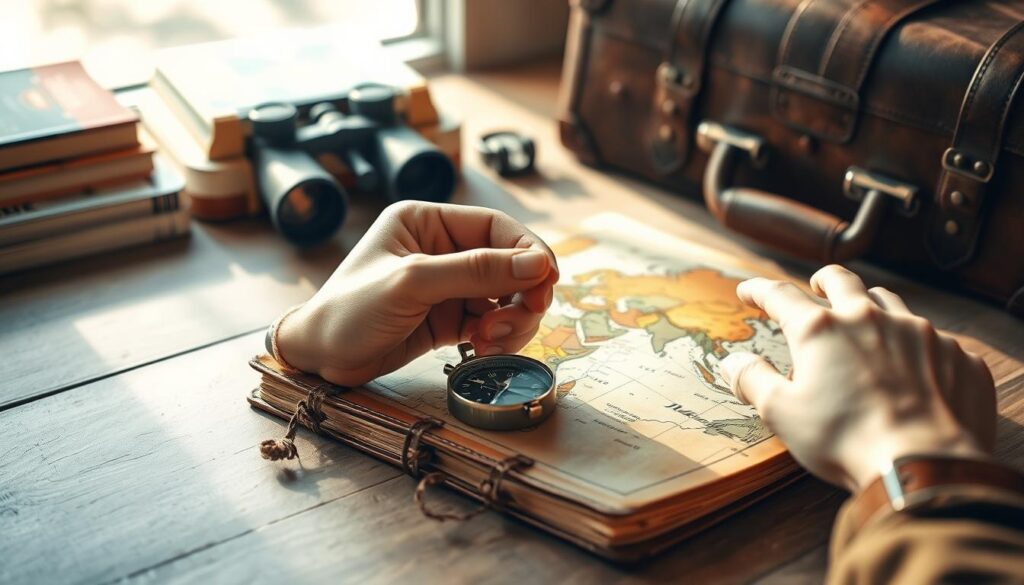
- Plan breaks every two hours to stay alert and refreshed.
- Use offline maps to navigate areas with poor cell service.
- Pack a portable jump starter for roadside emergencies.
Preparation is key. For example, Mark Henricks, a freelance writer who’s traveled over 15,000 miles, emphasizes the importance of checking your vehicle’s battery, engine, and tires before hitting the road. “A little preparation saves a lot of headaches,” he says.
Here’s a quick comparison of common mistakes and expert solutions:
| Mistake | Solution |
|---|---|
| Overpacking | Use compression cubes and focus on essentials. |
| Ignoring breaks | Stop every 100 miles to stay alert. |
| Not saving maps offline | Download routes before departure. |
By following these tips, you’ll transform your journey into one to remember. Whether it’s a short weekend trip or a cross-country adventure, expert advice ensures you’re ready for anything.
Staying Safe: Travel Insurance and Security Strategies
Staying safe while exploring new places is a top priority for every adventurer. A proactive approach to security and the right insurance plan can make all the difference. Whether you’re navigating crowded streets or remote areas, preparation ensures peace of mind.
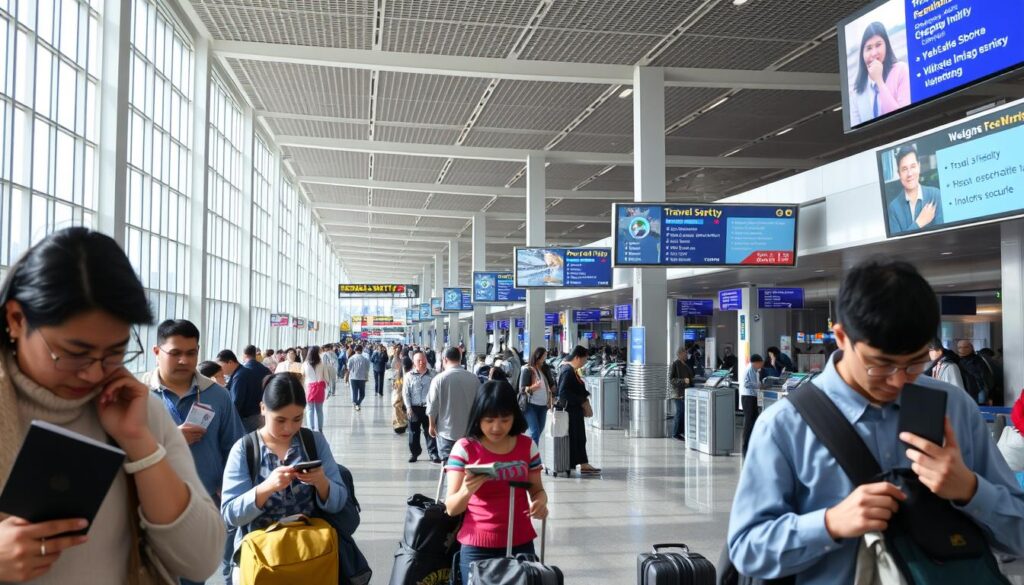
Travel insurance is more than just a safety net—it’s a necessity. Plans like Atlas Travel cover emergencies, from medical evacuations to trip cancellations. For example, if you’re hospitalized abroad, the Bedside Visit benefit can cover up to $1,500 for a relative’s transportation. This kind of support can turn a crisis into a manageable situation.
Protecting Your Belongings
Pickpocketing and theft are common concerns, especially in busy areas. Simple steps can significantly reduce risks. Use front pockets or specialized travel belts to keep valuables secure. Avoid carrying all your money in one place—split it between bags or partners.
Statistics show that 70% of travelers don’t have copies of important documents, leaving them vulnerable in emergencies. Always carry digital and physical backups of your passport, credit cards, and travel insurance details. This small effort can save you from major hassles.
Keeping Important Documents Secure
Your passport and other documents are your lifeline abroad. Store them in a hotel safe or a hidden pouch when on the move. Avoid leaving them unattended, even in seemingly secure places like rental cars or cafes.
Research local emergency numbers and pharmacies before your trip. Knowing where to go in a crisis can make a big difference. For instance, countries like Japan and Iceland are known for their safety, but it’s still wise to stay prepared.
Here are some best practices to safeguard your journey:
- Invest in travel insurance that covers medical emergencies and trip cancellations.
- Use anti-theft bags or belts to protect valuables.
- Keep digital and physical copies of important documents.
- Research local safety tips and emergency contacts.
By following these strategies, you’ll ensure a secure and enjoyable experience. Remember, a little preparation goes a long way in keeping you and your belongings safe.
Saving Money While Experiencing More
Exploring new destinations doesn’t have to break the bank if you know where to look. The key is to focus on value rather than chasing the cheapest deals. Sometimes, spending a little extra can lead to richer, more memorable experiences.

Value Over Deals: Smart Spending on Accommodations
Choosing the right place to stay can make a big difference. While budget options like hostels are great for saving money, they might not always offer the best experience. For example, small family-run hotels often provide a more authentic and welcoming atmosphere.
Local eateries are another way to save while enjoying delicious food. Instead of dining at tourist-heavy restaurants, explore neighborhood spots. These places often serve authentic dishes at a fraction of the cost.
Maximizing Your Budget with Smart Tools
Using the right credit card can also help you save. Look for cards that offer travel rewards and no foreign transaction fees. These perks can add up, especially on longer trips.
Here’s a quick comparison of budget-friendly strategies:
| Option | Benefit |
|---|---|
| Hostels | Affordable, great for solo travelers. |
| Local Eateries | Authentic food, lower prices. |
| Travel Rewards Cards | Earn points, avoid fees. |
By focusing on value, you can stretch your budget further and create unforgettable memories. Whether it’s a cozy hostel or a local café, these choices enrich your journey without overspending.
Handling the Unexpected on Your Journey
Life on the road is full of surprises, and handling them well can make your journey unforgettable. Whether it’s a delayed flight, a missed connection, or an unplanned detour, these moments can test your patience. But with the right mindset, they can also lead to unique adventures.
Dealing with Travel Delays and Unplanned Stops
Delays are a common part of the travel experience. Nearly 25% of flights face disruptions each year, so it’s wise to be prepared. Keep a flexible mindset and use the extra time to explore your surroundings. For example, a layover in a new city can turn into a mini-adventure.
Here are some tips to manage disruptions:
- Stay calm: Frustration won’t speed things up. Take a deep breath and focus on solutions.
- Have backup plans: Keep a list of alternative routes or accommodations in case of cancellations.
- Stay informed: Use apps like FlightAware to track delays and get real-time updates.
Real-life examples show how unplanned stops can become highlights. One traveler missed their train but discovered a charming café nearby. Another’s flight delay led to an impromptu city tour. These moments often create the best stories.
Preparation is key. Carry essentials like snacks, a portable charger, and a book to stay comfortable during delays. Keep emergency contacts handy, and consider travel insurance for added peace of mind.
Remember, flexibility is your greatest asset. When things don’t go as planned, embrace the opportunity to explore. You might just find that the unexpected turns into the most memorable part of your journey.
Traveling Solo: Embrace Independence and Local Interaction
Solo journeys offer a unique blend of freedom and self-discovery. Exploring the world alone allows you to set your own pace and make decisions that align with your interests. It’s an opportunity to step out of your comfort zone and grow as an individual.
One of the greatest benefits of solo travel is the chance to connect with local cultures. Engaging with residents can lead to meaningful interactions and a deeper understanding of your destination. For example, joining a cooking class or attending a community event can enrich your experience in ways guidebooks can’t.
However, traveling alone also comes with challenges. Safety is a top priority, especially in unfamiliar places. Here are some practical tips to stay secure:
- Keep copies of important documents like your passport and travel insurance.
- Use anti-theft bags to protect valuables.
- Research local emergency numbers before your trip.
Seasoned solo travelers often share stories of unexpected adventures. One traveler recalls missing a train but discovering a hidden café that became a highlight of their trip. These moments remind us that flexibility is key to enjoying the journey.
“Traveling solo taught me to trust myself and embrace the unknown. It’s not just about the places you visit but the person you become along the way.”
Preparation is essential for a smooth solo adventure. A well-organized book of useful phrases, local contacts, and itineraries can make navigating new places easier. It’s also wise to carry a portable charger and offline maps for convenience.
Here’s a quick comparison of solo travel benefits and challenges:
| Benefits | Challenges |
|---|---|
| Complete freedom to explore | Potential loneliness |
| Deeper cultural immersion | Safety concerns |
| Personal growth and confidence | Handling logistics alone |
By embracing independence and engaging with locals, solo travel can be a transformative experience. It’s a chance to see the world through your own eyes and create memories that last a lifetime.
Smart Packing Techniques for a Lightweight Trip
A well-packed bag can be your best friend on any journey. It ensures you’re prepared without feeling weighed down. With the right techniques, you can optimize space and reduce the burden of excess luggage.
Utilizing Compression Cubes and Travel Bags
Compression cubes are a game-changer for organizing your belongings. They maximize space by squeezing out excess air, allowing you to fit more into your suitcase. Pair them with a durable travel bag like the Monos Carry-On Plus, which weighs just 7.8 pounds and fits in overhead bins.
Rolling clothes instead of folding them can save up to 30% more space. This technique also reduces wrinkles, keeping your outfits fresh. Place heavy items at the bottom of your bag to improve stability and prevent damage.
Essential Clothing and Accessories
Choosing the right clothing is key to packing light. Opt for versatile pieces that can be mixed and matched. For example, a pair of Duer LuxTwill High Rise cargo pants can transition from day to night effortlessly.
Pack wrinkle-proof fabrics like knits and stretchy materials. They reduce the need for ironing and save time. A lightweight layering piece, such as the Patagonia Light Gust vest, is perfect for adapting to changing weather conditions.
Here’s a quick checklist for minimalist packing:
- Compression cubes for organization
- Versatile clothing pieces
- Travel-sized toiletries
- Portable charger and tech pouch
By focusing on essentials and using smart tools, you can avoid carrying everything you own. This approach ensures a lightweight and stress-free trip.
Navigating Airport Procedures Like a Pro
Navigating airports can be a breeze with the right approach. Whether you’re a frequent flyer or a first-time traveler, understanding the process can save time and reduce stress. From check-in to security, a few smart strategies can make all the difference.
Start by arriving early. For domestic flights, aim for one to two hours before departure. International trips require at least two to three hours. This buffer accounts for unexpected delays, like long lines at check-in or security.
Organize your documents and electronics before heading to the terminal. Keep your boarding pass, ID, and credit card easily accessible. Place laptops and liquids in separate bins during security screening to speed up the process.
Wearing the right shoe can also save time. Slip-on styles are ideal for quick removal at security checkpoints. Avoid belts or jewelry that might trigger alarms, and keep a reusable water bottle in your bag to stay hydrated after passing through security.
Here’s a quick comparison of common airport challenges and solutions:
| Challenge | Solution |
|---|---|
| Long security lines | Use TSA Precheck for expedited screening. |
| Overpacked carry-on | Stick to essentials and use packing cubes. |
| Missed boarding calls | Set reminders and stay near your gate. |
By following these tips, you’ll transform your airport experience from chaotic to seamless. Preparation and organization are your best tools for a stress-free journey.
Eating Like a Local: Dining and Cultural Experiences
Discovering the heart of a destination often begins with its food. From bustling street markets to cozy family-run eateries, dining like a local offers a window into the culture and traditions of a place. It’s not just about the flavors—it’s about the stories behind each dish and the people who create them.
Avoiding Tourist Traps
Tourist traps are easy to spot if you know what to look for. Restaurants with menus in multiple languages or located near major attractions often cater to visitors rather than locals. Instead, venture a few blocks away to find hidden gems where the locals eat.
Ask for recommendations from your accommodation host or a trusted local. Platforms like Google Maps with user-generated reviews can also guide you to authentic spots. Remember, the best meals are often found where the crowds aren’t.
Finding Authentic Street Food and Local Restaurants
Street food is a treasure trove of local flavors. Vendors often serve dishes passed down through generations, offering a taste of tradition. Look for busy stalls with long lines—it’s a sign of quality and popularity among locals.
Family-run restaurants are another great option. These establishments often prioritize fresh ingredients and homemade recipes. For example, in Italy, Cesarine connects travelers with local hosts for authentic regional meals. Such experiences go beyond food, offering a deeper connection to the culture.
Here are some tips for dining like a local:
- Visit farmers’ markets for fresh, seasonal ingredients.
- Ask locals where they eat, not just where they recommend.
- Try dishes that are unique to the region.
Dining where the locals do not only saves money but also enriches your journey. It’s a chance to step off the beaten path and create unforgettable memories.
Utilizing Technology and Travel Apps for Efficiency
Technology has revolutionized the way we explore the world, making every step of the journey smoother and more efficient. From planning routes to tracking flights, modern tools can save time and reduce stress. By leveraging the right apps, you can focus on enjoying your adventure rather than worrying about logistics.
One of the most valuable tools is offline maps. In areas with spotty internet, these maps ensure you never lose your way. Apps like Google Maps allow you to download routes before departure, providing reliable navigation even without a connection. This feature is especially useful in remote or unfamiliar locations.
Offline Maps and Flight Tracker Apps
Flight tracker apps are another essential tool. They provide real-time updates on delays, gate changes, and cancellations. Tools like FlightAware and Google Flights keep you informed, so you can adjust your plans as needed. This is particularly helpful during peak travel seasons when disruptions are more common.
Here’s a quick comparison of popular travel apps:
| App | Feature |
|---|---|
| Google Maps | Offline maps, real-time navigation |
| FlightAware | Flight tracking, delay alerts |
| Google Flights | Price comparisons, itinerary management |
Efficient use of technology can make your journey less burdensome and more enjoyable. Before you leave, download the necessary apps and ensure your devices are fully charged. This small step can save you from unnecessary stress and keep your adventure on track.
Advanced Pre-Trip Preparation for a Smooth Journey
Taking the time to prepare thoroughly can make your trip seamless and stress-free. A well-thought-out plan ensures you’re ready for every aspect of your adventure, from packing to navigating unexpected changes. By focusing on details early, you can avoid common pitfalls and enjoy a more relaxed experience.
Creating a Comprehensive Packing List
Start by making a detailed packing list. This helps you stay organized and ensures you don’t forget essentials. Include versatile clothes that can be mixed and matched for different outfits. Rolling your clothes instead of folding them saves space and reduces wrinkles.
Don’t overlook smaller items like chargers, adapters, and travel-sized toiletries. A well-prepared list keeps your bag light and efficient. Remember, packing smart is a rule every traveler should follow.
Checking Weather and Travel Advisories
Before you leave, verify the weather forecast for your destination. This helps you pack appropriately and avoid surprises. For example, knowing if rain is expected can save you from soggy shoes or ruined plans.
Check travel advisories for safety updates and local regulations. Some destinations may require vaccinations or have specific entry requirements. Staying informed ensures you’re prepared for any situation.
Here are some tools to keep your plans organized:
- Use apps like Google Keep for digital packing lists.
- Download offline maps for easy navigation.
- Set reminders for important deadlines, like passport renewals.
By investing time in advanced preparation, you’ll set the stage for a smooth and enjoyable journey. A little effort upfront goes a long way in ensuring your trip is stress-free and memorable.
Conclusion
Every journey offers a chance to grow and learn, especially when you’re prepared. Throughout this guide, we’ve shared practical strategies to make your next adventure smoother. From packing smart to staying safe, these insights can transform any trip into a stress-free experience.
Learning from past experiences is a valuable trick to avoid common pitfalls. Whether it’s checking passport validity or using offline maps, small steps can make a big difference. Being prepared ensures you’re ready for whatever comes your way.
As you plan your next trip, consider these tips to enhance your experience. Whether it’s a weekend getaway or a month-long exploration, preparation is key. Share your own stories and tips—your insights might inspire others to embark on their own unforgettable journeys.

